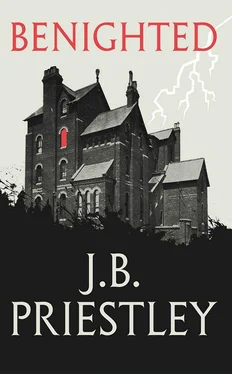Mr. Femm retreated a step, his eyes two pin-points in a crumpled sheet of paper. Penderel hadn't seen a man look so frightened for years. What an oddity! – dense at first, and then flying into a panic. A man so thin, with so little flesh and so much shining bone ought to be braver than that; he was almost a skeleton, and skeletons, jangling and defiant, are brave enough. It's our flesh, Penderel told himself, the jellied stuff that rots so easily, which quivers and creeps, goes goosey with fright; but our bones stand up and don't give a damn. This fellow was a fraud.
Mr. Femm had now turned and gone hissing towards his sister. "Did you hear that?" he asked her. "They say there's been a landslide on each side of us, and floods too. The lake has burst its banks. We are trapped. We shall have to go. Do you hear?" His voice had almost risen to a scream.
She was now as quiet as he was noisy. She looked him up and down contemptuously, clasped her little fat hands in front of her, and said: "Yes, I heard. I've expected it after all this rain and rain and rain. It will all come tumbling down again. God is not mocked." She gloated over this, and looked at her brother triumphantly, her suety face alight with malice. "You're afraid, Horace. You don't believe in God. Oh, no! But you're afraid to die. You don't believe in His mercy, but now you can believe in His wrath." She looked at him steadily, and then when he opened his mouth to reply she went on again, more vehemently. "You've seen His anger in the sky. You've heard Him in the night. And you're afraid. Where's your mocking now?" She stopped, and nobody spoke or stirred for a moment. "Well, your time hasn't come yet. This house is safe enough. This has happened before, before you came back, Horace, and we were never touched." She turned her head. "Morgan, come here," she shrieked, and when he came towering above her, she screamed up at him: "You remember the great storm, when we were cut off once before, and there were floods and landslides and the road down there was all washed away? This house was safe then, wasn't it?"
Morgan nodded and made a noise in his beard. Then he made a sweeping gesture to include the whole house, and pointed impressively to the floor.
"Morgan remembers," cried Miss Femm. "He means that the house was safe because it stands on a great rock."
He nodded his head affirmatively again, pointed to the back of the house, raised his finger, and then clenched his fist, grinning trollishly throughout the dumb show.
"He means that this rock comes out at the back of the house and shields it," Miss Femm explained. "Morgan remembers the last time we had storms like these, when this was the only place left untouched. And so you see, Horace, we can stay where we are."
Mr. Femm had now recovered himself. "It is obvious," he said, looking at Mrs. Waverton, "that you will have to remain here for the night. The misfortune is yours, not ours. I am afraid we can promise you very little."
"No beds," screamed his sister, with that terrifying unexpectedness of hers. Penderel had begun to cherish an intense dislike of her, and longed to bellow in return, particularly when she gave another screech: "They can't have beds."
"As my sister hints," said Mr. Femm, smoothly, "there are no beds, I am afraid, at your disposal. Indeed, this is the last house in Britain I should choose to be either a guest or a host in. But please remember that it is not mine."
"We really don't need beds or anything, thank you. We quite understand," Mrs. Waverton told him.
"Just a roof," added Waverton.
"And a fire," Penderel put in. And for the love of Mike, he whispered to himself, a drink too. A brief tussle with floods and landslides was sufficiently heartening in itself, but an acquaintance with this house, these people, was not to be undertaken feeling all cold and dark inside, without a drink.
A faint suggestion of geniality, like a leaden and watery gleam of November sunshine, crept into Mr. Femm's manner. "Of course, of course! We can offer you a roof and a fire and some food and drink. You can spend the night sitting round the fire here, perhaps the best place a night like this. I am not sure that I want to go to bed myself to-night. Morgan, attend to the fire. You must make yourselves as comfortable as you can." He bent forward again and hissed: "Perhaps we could have supper soon, Rebecca."
"I'll see that they have some supper, Horace," cried his sister. "Don't give yourself airs. You're not the master here."
"What about the car?" Waverton asked. "Is there anywhere I could put it where it would be safe all night?"
"Your motor car? You have it outside there?" Mr. Femm twisted his long dry fingers and called Morgan from the fire. "There are out-houses, round the corner there, on the left, where we only keep a horse and a trap now. There might be room for a motor car there. Morgan will know. Morgan, go with this gentleman and see if there is room for his motor car in the stables or coach-house." Morgan nodded sullenly and lurched towards the door.
"What about the bags?" Waverton looked at both his wife and Penderel.
"We'll get them in," Penderel replied.
Mrs. Waverton was emphatic. "I simply must have mine, Philip. I'm soaked to the skin and must change my things. Bring the bags in now."
Darkness and rain and a vague tumult still held the night. "Thank God I'm now seeing the last of this car to-night," Waverton said, as they tugged at the straps round the luggage grid. "We're well out of this, though I must say this is a queer house."
"A very queer house and very queer people," Penderel replied, pulling at the swollen leather. "I now know the real meaning of the phrase, 'Cherchez les Femms.' I've taken this old bag of mine into some damned odd places, but I have a feeling this is going to be about the oddest."
Waverton grunted. "It's better than capering in the dark along roads that aren't there, anyhow. It's safe and there's a roof and a fire."
"Nothing's safe," said Penderel, swinging out two bags. "Perhaps this is the fire, and we're merely taking the bags out of the frying-pan." He hurried round to the door and did not hesitate to jostle Morgan, who had been standing in the doorway all the time. If the man didn't like it, he could lump it, and lumping it seemed to be all he could do. A gorilla would have been a little more amiable and helpful: the man overdid his dumbness and his part as giant troll.
They all began bustling about now, just as if the hall had been suddenly turned into a railway station, Penderel thought. Mrs. Waverton, looking less like a superior person than usual (she was really rather pretty), shed her sodden hat and coat, pounced upon one of the bags, and was now exchanging confidential little shrieks with Miss Femm. Waverton had gone out again, accompanied by Morgan, and was now steering his car round the corner into the coach-house or shed or whatever it was. Mr. Femm had gone creaking away somewhere. Penderel did his best to join in the bustle, but when he had taken off his heavy dripping coat and had flung it over his bag near the door, there was nothing left for him to do. He lit a cigarette, sat down near the fire, and dreamily regarded his steaming outstretched legs and enjoyed the creeping warmth. He was tired. Images of his companions came floating by like spectral ships: Mrs. Waverton, one of those pale and clear and terrifically educated women who knew everything and who knew nothing, never actually breaking through into the real world; Philip Waverton himself, crammed with shy sense and honest-to-God feeling, but too anxious, too married, too well broken-in; the Femms here, the string-and-bone dithering male and the fat and somehow obscene female, with her revivalist God, and that tongueless hulk of a Morgan. And there was another somewhere, upstairs in bed. What was his name? Sir Roderick – that was it. Old Sir Roderick, the master of the house, doomed to be for ever upstairs silent and unseen. Did he ever give any orders? Perhaps Rebecca brought them down – what was it? – written on tables of stone.
Читать дальше










